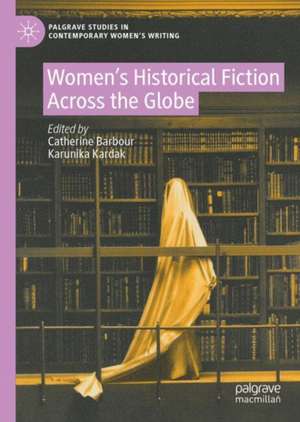Women’s Historical Fiction Across the Globe: Palgrave Studies in Contemporary Women’s Writing
Editat de Catherine Barbour, Karunika Kardaken Limba Engleză Hardback – 2 iun 2024
Chapter 1 of this book is available open access under a CC BY 4.0 license at link.springer.com, thanks to the generous support of Trinity College Dublin Trust.
Preț: 747.84 lei
Preț vechi: 821.80 lei
-9% Nou
Puncte Express: 1122
Preț estimativ în valută:
143.10€ • 149.79$ • 119.10£
143.10€ • 149.79$ • 119.10£
Carte nepublicată încă
Doresc să fiu notificat când acest titlu va fi disponibil:
Se trimite...
Preluare comenzi: 021 569.72.76
Specificații
ISBN-13: 9783031363597
ISBN-10: 3031363590
Pagini: 304
Ilustrații: Approx. 305 p. 20 illus. in color.
Dimensiuni: 148 x 210 mm
Ediția:2024
Editura: Springer Nature Switzerland
Colecția Palgrave Macmillan
Seria Palgrave Studies in Contemporary Women’s Writing
Locul publicării:Cham, Switzerland
ISBN-10: 3031363590
Pagini: 304
Ilustrații: Approx. 305 p. 20 illus. in color.
Dimensiuni: 148 x 210 mm
Ediția:2024
Editura: Springer Nature Switzerland
Colecția Palgrave Macmillan
Seria Palgrave Studies in Contemporary Women’s Writing
Locul publicării:Cham, Switzerland
Cuprins
Introduction: Catherine Barbour and Karunika Kardak, ‘New Directions in Women’s Historical Fiction Across the Globe’.- Section 1: ‘Remembering’.- Chapter 1: Elisa Sampson Vera Tudela, ‘Recovering and Rewriting the Past through the Testimonial: Claudia Salazar Jiménez’s Fictions of Contemporary Peru’.- Chapter 2: Kata Gyuris, ‘“Turn remembrance into a sly weapon”: Reclaiming Archival Memory in Maaza Mengiste’s The Shadow King’.-Chapter 3: Seoung Yun Lee, ‘An epic journey into history: reified memories in Korean “comfort women” novels’.-Section 2: ‘Retelling’.- Chapter 4: Tegan Zimmerman, ‘Speaking Through Stone: Mother-Daughter Plots in Dahlma.- Llanos-Figueroa’s Neo-Slave Narrative Daughters of the Stone (2009)’.- Chapter 5: Nisha Ghatak, ‘In the Shadows: Privilege and Feminine Disquiet in Aruna Chakravarti’s Jorasanko’.- Chapter 6: Linda Garber, ‘‘Yo Ho, Yo Ho, a Pirate Dyke for Me’: Contemporary Lesbian Historical Fiction’.- Chapter 7: Bonnie Thomas and Beth Kearney, ‘‘Bringing toLight’ a Marginal Figure of History: Photography in Gisèle Pineau’s Ady, soleil noir (2021)’.- Section 3: ‘Resisting’.- Chapter 8: Radhika Sharma and Nagendra Kumar, ‘Personal, National and Historical: Indo-Pak Partition as an Embodied Experience’.- Chapter 9: Guadalupe Elías, ‘Carmela, Catalina and Black Lemon Leaves. Mexican History and Coloniality in Ángeles Mastretta’s Arráncame la vida (1985)’.- Chapter 10: Jessica Habib, ‘Between the Self and the Collective: Reading Daughter Narratives and Postcolonial Settings in Erendiz Atasu’s The Other Side of the Mountain (2000) and Consuelo Baehr’s Three Daughters (2014)’.
Notă biografică
Catherine Barbour is Assistant Professor in Hispanic Studies at Trinity College Dublin, Ireland. She specialises in contemporary Iberian literature and visual culture, with keen interests in comparative literature. Catherine has published widely on intersectional approaches to gender in Galician cultural production and is the author of Contemporary Galician Women Writers (2020).
Karunika Kardak has a PhD in Hispanic Studies from the University of St Andrews, UK, and is the author of Memory, Identity and the Historical Novel in Uruguay: Opening up the Archive 1985-2010 (2023).
Karunika Kardak has a PhD in Hispanic Studies from the University of St Andrews, UK, and is the author of Memory, Identity and the Historical Novel in Uruguay: Opening up the Archive 1985-2010 (2023).
Textul de pe ultima copertă
This book explores contemporary women’s historical fiction from global perspectives and expands substantially on existing studies by drawing on intersectional, transnational and decolonial approaches to examine texts originating in different languages and engaging with diverse time periods, contexts and cultural settings. The chapters explore how the genre of women’s historical fiction unearths women’s historical experiences and adds to historical narratives in order to counter and challenge colonial, heteropatriarchal ‘official’ histories. The collection addresses how women writers utilise the genre to reclaim personal and collective memory as well as write back into history marginalised, oppressed and overlooked subjectivities, especially those of racialised, migrant, disabled, LGBTQIA+ and other minoritised communities.
Chapter 1 of this book is available open access under a CC BY 4.0 license at link.springer.com, thanks to the generous support of Trinity College Dublin Trust.
Catherine Barbour is Assistant Professor in Hispanic Studies at Trinity College Dublin, Ireland. She specialises in contemporary Iberian literature and visual culture, with keen interests in comparative literature. Catherine has published widely on intersectional approaches to gender in Galician cultural production and is the author of Contemporary Galician Women Writers (2020).
Karunika Kardak has a PhD in Hispanic Studies from the University of St Andrews, UK, and is the author of Memory, Identity and the Historical Novel in Uruguay: Opening up the Archive 1985-2010 (2023).
Chapter 1 of this book is available open access under a CC BY 4.0 license at link.springer.com, thanks to the generous support of Trinity College Dublin Trust.
Catherine Barbour is Assistant Professor in Hispanic Studies at Trinity College Dublin, Ireland. She specialises in contemporary Iberian literature and visual culture, with keen interests in comparative literature. Catherine has published widely on intersectional approaches to gender in Galician cultural production and is the author of Contemporary Galician Women Writers (2020).
Karunika Kardak has a PhD in Hispanic Studies from the University of St Andrews, UK, and is the author of Memory, Identity and the Historical Novel in Uruguay: Opening up the Archive 1985-2010 (2023).
Caracteristici
Considers how historical fiction by women writers subverts or counter-writes historical narratives Foregrounds how women writers of historical fiction explore experiences relating to race, class, gender, sexuality, disability, nation and migration status Takes a transnational, multilingual and decolonial approach, bringing approaches from the 'Global South' and ‘Global North’ into dialogue






